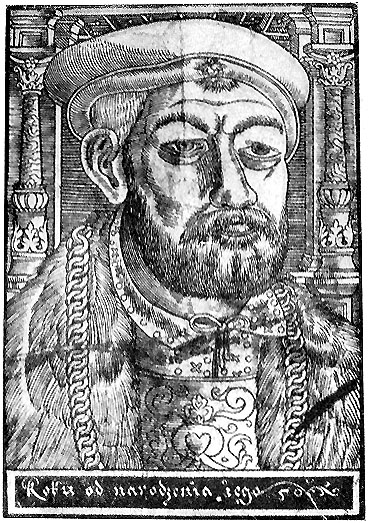
Born: February 4, 1505, Zurawno, Poland
Died: between September 8 and October 5, 1569, Rejowiec, Poland
Summary. Mikolaj Rej or Mikolaj Rey of Naglowice (1505-1569) was one of the best known Polish poets and writers of the Renaissance originator of Polish literary tradition. He wrote exclusively in Polish. Rej took part in Sejm and thought his writing to be an important social mission. A Calvinist since 1541 or 1548. He was adherent of reforms and supported the aspirations of limiting the privileged position of the magnates and the clergy.
Early days. Rej was born in a noble family in Zurawno near Halicz. His father, Stanislaw Rej, a nobleman of Oksza Coat of Arms, moved to Zurawno from Naglowice near Kraków. His mother was Barbara nee Herburt. In 1514-1516 he went to school in Skalmierz, and then in 1516-1518 in Lwów and in 1518 one year in Jagellonian University in Cracow. Despite of incomplete formal education he managed to educate himself by studying Latin literature and contemporary art. In 1525 he went to the court of his relative, Andrzej Teczynski, Voivoda of Sandomierz where he spent few years. After the death of his father, in 1531, he moved to the Chelm area, and from then on frequented the court of his cousin, Hetman Mikołaj Sieniawski, who was a prominent representative of Polish Protestants. In 1541 or 1548 Rej was converted to calvinism, took part in synods and founded protestant schools and communities on his lands.
A writer. He was one of the first Polish poets writing in Polish.
In 1543 Rej made his debut under the pen name Mikolaj from Naglowice writing a book titled, “Krótka rozprawa miedzy trzema osobami, Panem, Wójtem a Plebanem” (A Short Discourse Between the Squire, the Bailiff, and the Parson) which was a satire on the gentry, on the clergy, on malfunctioning of the institutions of nobleman’s democracy, on the corruption of the officials etc.
In 1545 he wrote in verse a 12 act drama, “Zywot Józefa z pokolenia zydowskiego, syna Jakubowego” (The life of Joseph…), based on the play by a Dutch author, Cornelius Crocus.
Next, in 1546, he wrote “ David’s Psalter” which was a prose paraphrase of a Latin translation of David's Psalter by Johan van der Campen.
This was followed in 1549 by a play “Kupiec” (The Merchant) based on „Mercator seu indicium” by a German writer Neogeorgus. Rej, like the author of the original, tried to prove in his play the superiority of pure faith over good deeds.
In 1557 appeared a collection of sermons “Postilla Panska” (God’s Postilla) that became a “bestseller” translated also into Ruthenian and Lithuanian.
Next year he published “Wizerunk własny zywota czlowieka poczciwego”( A Faithful Image of the Life of an Honest Man). This was an adaptation of a Latin poem “Zodiacus Vitae” (Life’s Zodiac) by Pier Angelo Manzoni de la Stellata called Palingenius.
In 1562 appeared “Zwierzyniec, w ktorym rozmaitych ludzi, zwirzat i ptakow kstalty, przypadki i obyczaje sa wlasnie wpisane” (The Zoo…). It is composed of four chapters. The first one, in which one sees the influence of Erasmus of Rotterdam and Battista Fulgosa, includes apoftegmata. The second one consists of sometimes satirical portrayal of contemporaries like Rej, Kochanowski, Trzecieski and others. The third one includes characteristics of professions and offices. In the fourth one finds practical for a nobleman. http://www.zwoje-scrolls.com/zwoje35/text28.htm This was followed in 1568 by “Zwierciadlo albo kstalt, w ktorym kazdy stan snadnie…” (The Mirror) composed of seven parts partially prose , partially in rhymes. The most comprehensive part of “The Mirror” is “Zywot czlowieka poczciwego” (Life of an Honest Man). It is Rej’s description of an ideal nobleman. He gives advices covering the entire live, from childhood to the old age. In other parts of “The Mirror” Rej debates the situation of the state, the analysis of the vices of the gentry, the threat from Poland’s neighbors etc.
Recognition. Rej was the first Polish writer to receive a major prize for his output. By the end of his life, he owned several villages. In 1540 he received Stajne and Pliskow and in 1546 Temerowce from King Zygmunt I the Old, and Dziewięciele from Zygmunt II August as a lifelong possession and two towns, one of them was Rejowiec, founded by the author in 1547, the other, Oksza, founded in 1554. He was happily married to Zofia Kosnowna. Rej was very popular during his life but partially forgotten till 19-th century when Mickiewicz who “resurrected” Rej in his “Parisian prelections.” Monographs and plays about Rej were written in20-th century. A monument of Rej was erected in Naglowice. The current year (2005) was pronounced by a Polish Sejm as a year of Mikołaj Rej due to 500 anniversary of his birth.
Source:
This article uses, among others, material from the Wikipedia article "Mikolaj Rej" licensed under the GNU Free Documentation License. :
>
Wikipedia
It is supplemented with information from other sources:
Halina Florynska-Lalewicz (in Polish)
Sciaga (in Polish)
“Zywot czlowieka poczciwego” (in Polish)
Minimal(in Polish)
“Wizerunek wlasny..) excerpts (in Polish)
English translations of some of his works:
Constance J. Ostrowski
Return to home page:
Prominent Poles